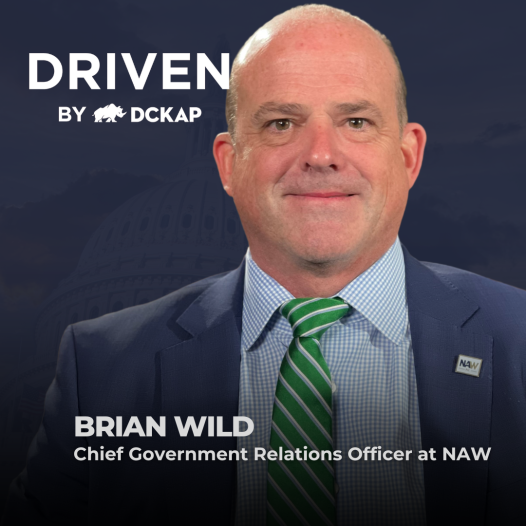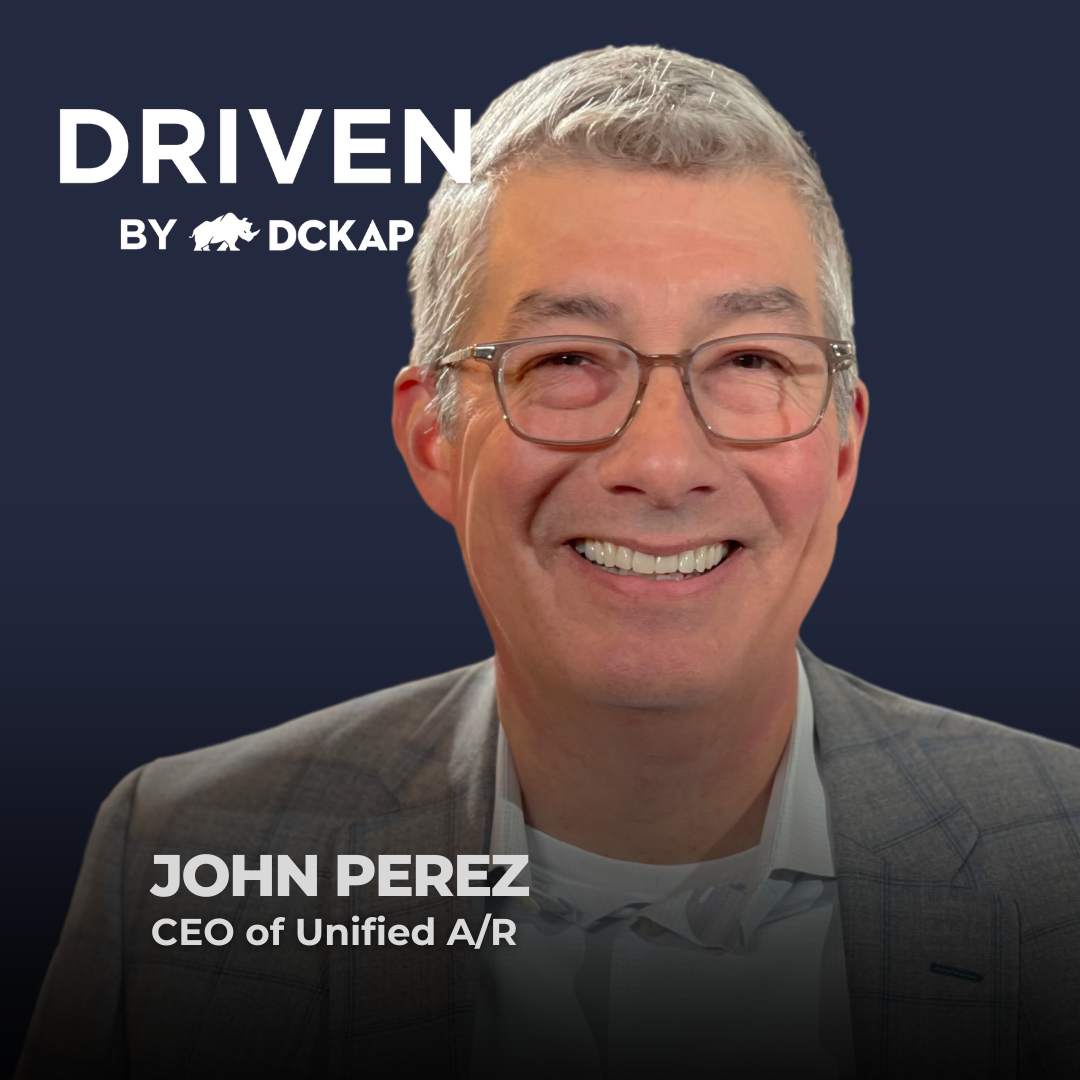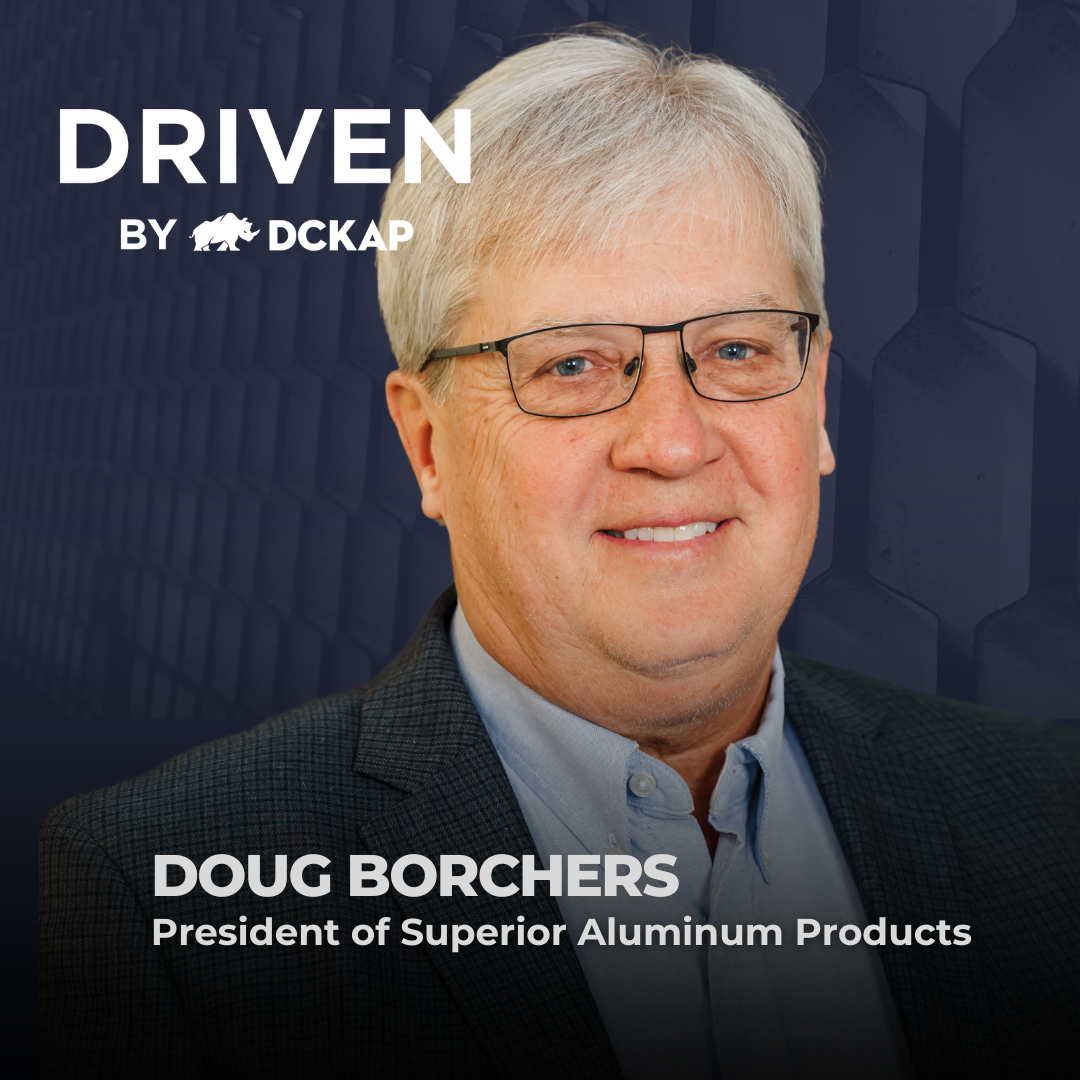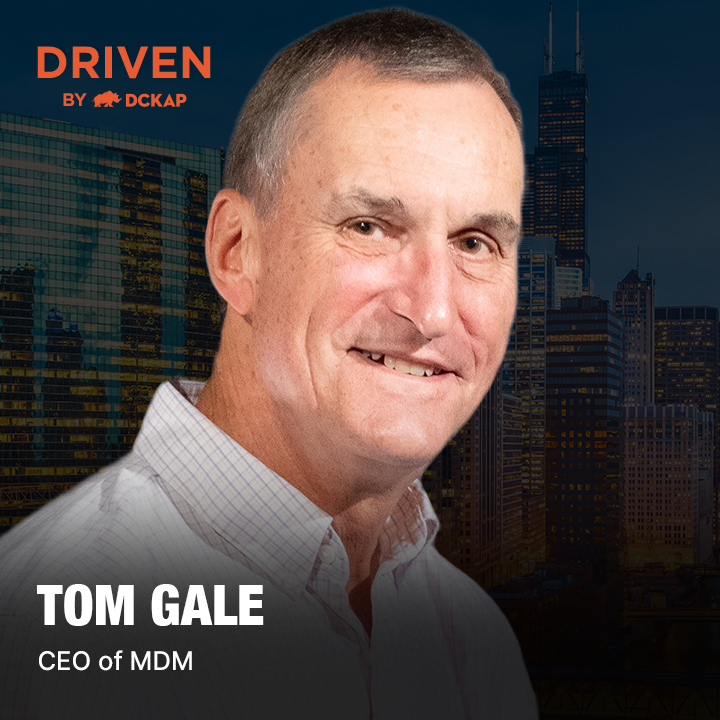Brian shares his genuine excitement about the world of politics, viewing it as a ‘contact sport’ that demands ongoing and active engagement, along with his voracious appetite for staying on top of current events, showcasing the strength of his commitment to political science, the support of industry growth, and what it takes to be the voice representing the best interests of the very businesses that make up the backbone of our economy.
OR LISTEN ON:
Karthik Chidambaram: We are here in Washington DC joined by a very special
guest, Brian, wild Chief Government Relations Officer at NAW. Brian, thank
you so much for joining me today, and great to have you on the show.
Brian Wild: Awesome. Well welcome to D.C.
Karthik Chidambaram: Yeah, D.C. is cold.
Brian Wild: It is, especially the last two weeks. It's been really cold.
Karthik Chidambaram: Yeah, it's always cold.
Brian, I mean, thank you for your time. Great to be chatting today. Chief
Government Relations Officer. What exactly is your role at NAW and how do
you help distributors?
Brian Wild: Sure. So one, my role is I'm basically the lobbyist for the
National Association of Wholesaler Distributors in our member organizations.
And under that apparatus, I'm, I actually- we have a political program. So I
run the political program, which is separate from lobbying. Then we have a
legal program, which is also separate and, and what we do is wholesale
distributors are busy trying to make money and run their business, and they
don't really have time or, or want to follow what's going on in dc let alone
weigh in on new regulations, new laws on that sort of thing.
So that's what we do. So our entire department is full of former hill
staffers and former regulators, and we track what's going on, what issues
matter regularly update the members on those issues, and then weigh in as
legislators, write law and make policy to make sure. That they're not
negatively impacting the industry.
Karthik Chidambaram: So let's say I'm a distributor in Wisconsin and I run
into, It's a great state to be distributed from, by the way, let's say I run
into some issues there. Okay. In terms of some label laws or something like
that, right. Do I reach out to NAW? Is that how it works? Or when does a
distributor really contact you?
Brian Wild: One, we mostly do federal issues, so we're mostly dealing with
Washington, DC and things that are going nationwide. We do have a state
program. That's really monitoring what's happening in Wisconsin
specifically. My hope is that I'm reaching out to you first and making you
aware, Hey, this is happening. I think this might have an impact on you,
rather than you telling me, because that probably means I'm not doing my job
as well as I would like to.
But when members do reach out, I say a lot. Politics is a contact sport. You
need to make contact to make it work. And so one, you'd flag the issue to us
in that case. And, and we do a deep dive. I, I have a team of experts on
specific. Issues if I don't have the answer they do on what the impact would
be.
And let's say we. It's gonna be a major deal. If it's impacting your
company, it's gonna impact a lot of other companies. We'll write issue
briefs and get everybody up to speed, and then we'll weigh in with the
legislators themselves. Say, Hey, I don't know if you intend to be doing
this, but what you're gonna do is going to.
Increased cost for the supply chain is might cost jobs. It's gonna make it a
less business environment. And we try to change things from there. It's
about knowing the issues and then it is, it's about relationships.
Karthik Chidambaram: So can you gimme an example of something where a
problem you solve for distributors, like a policy decision you helped?
Brian Wild: Sure. A lot of problems we've been on lately, it's, it's
defense, right? So we're, we're, we're hoping to stop bad things from
happening. There's very little proactive stuff out there. I mean, very few
business owners. Ever want to write a law, they usually want a law not to be
written. And so we spend a lot more time making sure that things don't harm
them than we are being proactive.
Recently, president Biden, his Department of Labor and OSHA issued an
overtime rule changing the framework for who gets paid overtime, what the
various salary thresholds for that over time. So we weighed in at the
Department of Labor and explained to them this is a major deal, especially
in our industry because.
We have inside sales folks, we have outside sales folks. We have a whole
diverse spectrum of people that all get treated different underneath that
overtime rule and tried to change what those salary thresholds were, what
those hour thresholds were, we lost as primary labor said, eh. You made a
lot of good points, but we don't really care.
We're gonna go ahead and do what we want to do. And they pushed that
forward. So we did the next step. We sued them and we actually took
Department of Labor to court. We sued them in Texas in the sixth district
court there. And the court ruled in our favor and said that in this instance
the Department of Labor had overstepped their constitutional authority, that
they didn't have the right to make those salary thresholds that they had
done and the way that they had done it.
So they struck the rule completely. That whole process sounds, I just
explained it and I, how long that took that was about a two year process and
it's time, it's energy and it's labor. Right. And you have a team of people.
There's a lot of really good lawyers that are involved in that. There's a
lot of good policy people that are involved in that, and there's a lot of
good communicators that are involved in that.
So yeah, as a distributor, I don't have to spend time there. Just leave it
to NAW And you represent on the distributor's behalf.
Brian Wild: Absolutely.
Karthik Chidambaram: So when these policies are laws are written, are they
for a specific industry or is that. On a whole, you know, how does that
work? I'm just trying to understand.
Brian Wild: Very complex question. So typically, no, most laws are not
written industry specific. So it impacts, let's say you, you have a
greenhouse gas emission standard, or you're doing electric, electric trucks.
They're not targeting us, but they're definitely impacting us. They're also
impacting the three PL carriers and UPS and a whole bunch of folks that we
don't consider distributors.
In that case, we form coalitions and a W'S kind of bread and butter. We are
the center of a lot of coalitions, so not only are we representing the
wholesaler distributors, but we're banding together with other industries,
the American Trucking Association, or the National Retail Federation. I. The
US Chamber of Commerce to create a coalition to fight an issue or to support
an issue.
There is issue specific legislation coming down the pike that definitely
impacts full sailing distributors. It's the first time that I've seen it.
I've been in DC for longer than I cared. When I showed up, I had a full head
of hair. Let's say that I've been here over 30 years and very rarely do you
see specific Legislation that only hits one industry.
There is a bill out there that's actually called the Warehouse Worker
Protection Act. It goes through NS codes, which is how primarily Department
of Commerce divide up business industries, and it only impacts NS codes that
are wholesaler distributors. So it doesn't matter whether you're a
distributor of beer and wine or pharmaceuticals or HVAC equipment or, or
fasteners.
You're listed specifically in the bill, and it would target us. It's
interesting. I think it's a pushback against, frankly, Amazon. Walmart and
some of the bigger players in the retail space, unions are really active
there. They wanna start to unionize those warehouses and legislators at the
state level and the federal level have introduced legislation that puts
different restrictions.
It restricts surveillance, automation, technology in a warehouse workspace.
It implements an ergonomics rule for warehouse workers, whether worker A or
worker B is more efficient. So if worker A puts 10 apples in a bucket and
worker B puts 15 apples in a bucket, I can't give worker B a raise. Based on
that performance, but limits all of that.
On top of that, it creates a whole new department in the Department of Labor
that would have nothing but oversight over warehouse and distribution
workers. It gives power to the Federal Trade Commission to oversee any
merger and acquisition that happens in the warehouse space. This is a big
bill for us.
We're definitely fighting it, pushing back hard. But there is targeted
legislation for the first time that's hitting us, and hopefully we're gonna
stop it before it goes too far.
Karthik Chidambaram: So, hey, you know, make sure you run your business
well. Treat your employees well and that takes care of most of the things.
So is that what you would advise distributors as well, so that, you know, we
don't really have to offer feathers?
Brian Wild: I think that's exactly right. I think, you know, the
distributors that I talk to, and I've met with an, awful lot of them, almost
every single one of them starts the conversation about how great their
company culture is and they all talk about the fact that they have employees
that started as a forklift operator and now a branch manager and or started
as a I know some that started off as a secretary back when we still called
them secretaries and are now CEOs.
And that culture of investing in your workers, training your workers,
promoting your workers, and trying to get your workers to stay and be happy
treating them well. And so I think as long as we're doing that, I think most
of our member companies are in that space. I think we're gonna be fine. The
problem is.
In the process of trying to get some folks that don't do that, that treat
their workers more as temporary employees than as part of a team, they hit
us. And there's not a way to legislatively target a company, but there is a
way to legislatively targeted industry. And so we're kind of fighting other
people's battles right now.
Karthik Chidambaram: You talked about being proactive and as you know,
proactive policies really help a lot. You know, it also helps drive an
industry. So what is NAW doing? You know, in terms of some proactive
measures, which maybe we are not even talking about right now, but then
let's say if it's done, it might help distributors in a big way.
Brian Wild: So I think distribution especially is rabid defenders of free
enterprise. They really believe in capitalism, believe in entrepreneur. The
proactive part is going in and trying to strip away some of those burdensome
regulations only like in the tax code, freeing up resources that they could
use to invest back into their company.
One of the interesting things and about distribution, I think, is there's a
lot of third generation, fourth generation companies, there's a lot of
family run businesses, some of them in the billions of dollars, but they
still really operate like they're a family run business. And so things like
the estate tax of what happens when you pass down your property or your
business.
Those kind of issues I think we're trying to get ahead of so that's part of
the puzzle that distributors don't have to worry about. And so it's a pretty
broad agenda to just stay proactive. I think in the labor front there's a
bunch of things that we're trying to peel back some layers of regulation
that have happened.
And then I think one of the other issues is right now. California especially
to name names. California's a a nation unto itself and they're making rules
and regulations. We would love to get to a scenario where they don't have
that kind of power, that there's a federal rule on environment. There's a
federal rule on transportation and trade and trucking and that stuff.
Karthik Chidambaram:So the businesses have a little freer to cross borders
and expand, and we don't have. California telling finally what to do.
What is LPC? Is that a new program you guys started?
Brian Wild: It is and thanks for getting it right. LPC is our legal policy
center. I already highlighted one of the things that it did, which is
challenge the Department of Labor and the overtime rule.
This is a modernization of advocacy. Most people. Kind of know what a
lobbyist is. They think of walking the halls of Congress and shaking hands
with members of Congress and maybe even smoking a cigar and drinking a
martini, which I doesn't actually happen. And talking policy. What's
happened is Congress has stopped making a lot of law.
So historically I. Congress usually sends about 400 bills to the President's
desk to be signed, and the last Congress sent about 40. So when Congress
doesn't make law, policy goes somewhere else to be made, and that policy's
increasingly made in the Executive branch. So. That's why I keep talking
about regulations.
That's why I keep talking about us fighting the Department of Labor or
whatever, because they really have been empowered because Congress isn't
doing their job and the only way to fight that is to be part of the comment
period and to, and to push that forward. And then when you have to sue 'em
and to really ask the courts third branch of government to weigh in and say.
Do they actually have the authority to do it? And so the Legal policy center
is that aspect of it. We've just built that off to kind of pick up the slack
that Congress has dropped. And so we're pushing forward a whole host of
cases. We weighed in on FTCs non-compete Clause won that. We weighed in on
DO'S overtime rule, we won that.
But there was recently a Supreme Court case against a food distributor. So
EMD sales is a food distribution company. And it was over the definition of
outside sales. It went all the way to the Supreme Court and our legal policy
center weighed in on that and really was asked by the Supreme Court to
explain what outside salespeople are.
You know, there's no reason a Supreme Court justice should even understand
what that is. And so, you know, really we had our lawyers on the phone with
distribution members who would sit in and say, Hey, this is how we use
outside sales. This is how we use inside sales. This is why they're
different. They then turned around, explained that the Supreme Court in the
end, we got a unanimous decision from the Supreme Court just a couple weeks
ago on that.
We don't have to change anything we do. So that's, I think the legal policy
center is, I'm super excited about it. 'cause to me it's fun and new and,
but it's, it's getting really permanent victories in places where we can,
hope, pay for all these expenses.
It's a combination of flushing cash as a lot of trade associations are. Some
of it is membership dues, go towards government relations and help us with
the legal policy center, but. On top of that, we try to leverage as much
money as we can. You has an incredible reputation here in Washington DC.
Over 40 something years of being an honest broker on policy issues has given
us a lot of bandwidth and trust, and people wanna partner with us.
So a lot of what we've done in legal policy centers, we've leveraged that
and we find lawyers, great constitutional scholars. They wanna prove a
point. I mean, these are people that care. And so they take on our case for
either free or for a discounted rate because they wanna try a case in front
of the Supreme Court who doesn't wanna do that?
And then we do have, we ask our members to give more. So we have a handful
of companies that have really felt the challenge and understand the startup
costs. And lawyers are more expensive than lobbyists and help. advanced fund
some of those things. So we're asking for members to contribute.
We're asking for partners to contribute, and it's been welcomed, I think,
pretty well for a year in. I think we're on pretty good footing.
Karthik Chidambaram: And what's one thing you love about your job and what's
one thing you hate?
Brian Wild: I actually enjoy, I get a high off of politics and politics.
Maybe I get a high off of policy.
I came to DC years and years ago with this thought that I was gonna change
the world. I hope. That's why most people come to Washington, DC. I still
have that feeling. So many years later, like I, I wake up and I think, I
think I could change the world today. I like that. I like that the issue set
is always changing.
I mean, right now the difference between Washington DC today and four weeks
ago is really dramatic and I like that. I kind of like the chaos that
government relations has. And I think for NAW in particular, it's important.
Everybody has a different reason why they care about politics. Some people
it's social issues.
Some people it's a cause a care, it's a specific thing. Maybe it's cancer
research or whatever. The thing that drove me way back when I first started
interested, I like capitalism. I actually believe in it. I think that, you
know, we were a country founded as a capitalist country before we were
founded as a republic, and I like to defend that.
So I found a great niche at NAW that they push all of the issues that I like
the most. I get to work on what I wanna work on. It's the old, what color is
my parachute thing, and I found the right color. What I don't like about it,
the thing that I don't like is just the amount of nonsense. That sometimes I
have to put up, and it's not from our members.
It's the problem with politics. I wish every conversation politics could be
productive and interested, and two people at a tables both trying to achieve
something. For every one of those productive conversations that I have, I
spend nine that are completely non-productive, and I think that's changed
over time too.
I'll be the jaded DC. Inside the beltway swamped while our here, but it used
to be a lot. I think everybody was here trying to be productive and you
could disagree with each other openly and honestly, and still move on and
solve other problems. That percentage of people that are there for
productive reasons is declined.
It's harder and harder to find those conversations.
Karthik Chidambaram: I would like to end with this question. What book are
you reading right now or is there something you're listening to which you
would like to share?
Brian Wild: I am currently reading How Green Is My Valley, is the book I'm
currently reading. It's an old book. It talks about coal mining and Wales,
way back when. Fiction, I don't read a lot of nonfiction. I do nonfiction
for a job and so I like to do fiction and I especially love well-written
books and older authors. So I, I kind of dwell on that. It's escapist to me
to read literature. And then, what was the second part of your question?
Karthik Chidambaram: A podcast you listen to or somebody you follow, or who
do you follow?
Brian Wild: Well, I have four children so I listen to whatever they tell me
to listen to. I don't podcast. Here it is. I'm a voracious reader. I read a
lot. I subscribe to probably four newspapers that I read diligently every
day, and probably another six newsletters.
That I read every day and I read them all for different purposes. I will say
I like The Economist a lot. I like how the Brits write from the outside. I
think a lot of times they're wrong, but I, I, I always find it a little
interesting. And then here, there's, there's actually a newsletter in DC
called Sior. Which I really like. Of all of the daily political rags that we
do, I think they do a really great job. It's insightful. It's not just
reporting. There's a insightfulness that you get from it. So those are
probably my two go-tos.
Karthik Chidambaram: You follow a schedule with respect to reading or you
just read whenever you find time? Or how does that work?
Brian Wild: Both.
Karthik Chidambaram: How's that?
Brian Wild: So one, I do have a schedule. I wake up, I read pretty much
nonstop, and the second I'm awake, I try to go through all of the dailies
that I can, the Times, New York Times, Washington Post, Wall Street Journal.
I do the front page, back page, opinion page. I read the Denver Post Sport
pages 'cause the Denver Broncos are the greatest team.
I'm a big Premier League soccer guy. So I read The Athletic on whatever's
happening with Liverpool and then I dive into the political stuff on the
newsletter. So I kind of have a routine that I try to. Until it gets blown
up by whatever chaos and crisis exists. I save my long reads, my Atlantic
and my economists and stuff.
I save those for the weekends. And you know, that's, it's me and my dog
while my children are still sleeping. 'cause they're old enough now that I
wake up before they do. And I watch soccer and I read those.
Karthik Chidambaram: So Brian, thank you so much for joining me on this
driven conversation. I enjoyed chatting with you and thanks for helping us
learn about government relations at NAW. Thank you for joining our Driven by
DCKAP podcast.
Sign up to receive email updates
Enter your name and email address below and I'll send you periodic updates about the podcast.




